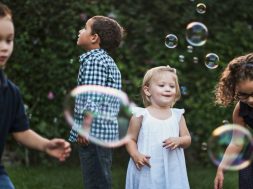
Mindfulness has become one of the buzzwords of the past decade. Mindfulness is receiving hype by in corporations, educational institutions, psychologist’s offices, fitness centres, and increasingly in our family homes. In fact, mindfulness in families is becoming almost essential. And for good reason.
Where science once rejected mindfulness as too “woo-hoo” and wishy-washy, recent research has shown that practicing mindfulness with our kids can have tremendous positive impacts.
Mindfulness training boosts children’s self-regulation, so they can stay in control better. It increases their ability to pay attention, and academic results improve. And mindfulness reduces anxiety, depression, and stress, helping children be calmer than they would without it. Their blood pressure and heart rate drop, and ADHD symptoms have been reduced. In short, mindfulness makes people feel better – children and adults. It builds resilience.
When it comes to children with special needs and challenges, mindfulness seems especially beneficial. One experiment found mindfulness reduced anxiety, built social skills, and improved academic performance for children with learning disabilities. A PhD dissertation with a small sample of children with significant emotional and behavioural difficulties found that mindfulness reduced children’s verbal aggression.
So what is mindfulness?
This is where experts get a bit fuzzy. It depends on who you ask. Meditation practices are brought in to mindfulness, but at the other end, some people say mindfulness is simply being mentally present.
Here’s how I define mindfulness:
Mindfulness is when we are actively focused on the here and now, and we feel engaged with what we’re doing. This is the opposite of mind-less-ness, which is where we are not really focusing on where we are or what we are doing, we are caught up in our emotions or other distractions, and we become super-rigid, only seeing things one way.
These are pretty big ideas, so how do we teach them to our children? And how do we act on them ourselves?
Babies
Babies are going to learn from us. The more calm, centred, and focused on them we are, the calmer and more centred they are likely to be. Gaze into your baby’s eyes. Focus on them when you’re with them. Leave the phone alone and engage with your baby mindfully. You might breastfeed (or bottle-feed), walk, sing, or talk with your baby. Perhaps you’re just lying on the bed, scratching their back and smiling at them. All the while, focus on being present and attentive to them right now. You’ll feel better, and so will they.
Toddlers and Pre-schoolers
Toddlers can be demanding. And we’re no longer on maternity leave so we often don’t have as much time to focus on them. That’s why it becomes increasingly important that we slow down a little and pay attention. Try getting them involved with you while you cook or tidy. Toddlers are usually willing helpers. Drop onto the floor with them and wrestle and play. Roughhousing is guaranteed to keep you mindful and alert. And put the phone away so you can focus on reading stories, singing songs, and saying goodnight.
By the time your children are toddlers, you can get them to do simple breathing exercises or body scans and progressive muscle relaxation. You can buy products to help, or simply lay on the floor beside your child and do some breathing for a few minutes, counting the breath as it goes in (for three seconds), hold it (for 3 seconds) and breathe out for 3-5 seconds. A body scan or PMR is easy too. Get your child to sit or lie comfortably and close their eyes. Then, starting at their toes, work your way up their body, asking them to imagine each body part being excited, and then relaxing completely.
Kids love these exercises, and they can genuinely reduce their stress, anxiety, and over-active jitters.
Primary School Children
In addition to the ideas for the younger age group, older children can start to become mindful as they interact with siblings, parents, and friends. They can learn to really listen. They can learn to be patient, to say thank you, and to say sorry to others or forgive. All of this requires them to be right there in the moment so they can understand what is going on around them.
If you are into meditation, you’ll find useful mindfulness meditations online and in stores to help your children become more mindful.
High School Children
For older children, everything above applies, but now it’s time to teach them about acceptance. A simple exercise, known as R.A.I.N., can help us (and our teens) stay in the moment and not get caught up clinging to their own emotions and everything that is happening around them.
R: Recognise. Acknowledge what is happening, just noting it in a calm and accepting manner.
A: Accept. Allow life to be just as it is, without trying to change it right away, and without wishing it were different somehow.
I: Investigate. See how it feels, whether it is making you upset or happy, giving you pleasure or pain, just note it. Focus on what your senses tell you. What do you see, feel, hear, smell, and taste?
N: Non-Identification. This is about being in the moment but a little emotionally detached. It can help to realise that the sensations you are feeling are just here for a moment, and they’ll pass. They’re not necessarily “true”, and they shouldn’t necessarily guide your decisions.
Mums and Dads
If we can do these things with our children, we’ll be far more mindful ourselves. This will help us be calm, kind, and compassionate. It will help us be balanced, even, and aware. And it will reduce stress and anxiety for everyone in the family. It will slow us down a little.
Sometimes, we need to stop and remind ourselves to be mindful though. That’s where the STOP acronym can help, so:
Stop. Just take a pause when you can feel things getting stressful, no matter what you’re doing.
Take a breath. As you pause, focus on your breathing. It will bring you back to the present moment.
Observe. Acknowledge what is happening, for good or bad, inside you or out. Just accept it.
Proceed. Now you’ve briefly checked in with the present moment, continue with whatever it was you were doing – but do it mindfully.
The benefits of mindfulness can’t be denied. But most families don’t do it. We’re too busy doing everything else! Tonight pause for a moment. Pay attention to where you are. Focus on your family. Be mindful. Feel the difference.
Article supplied with thanks to Happy Families.
About the Author: A sought after public speaker and author, and former radio broadcaster, Justin has a psychology degree from the University of Queensland and a PhD in psychology from the University of Wollongong.













